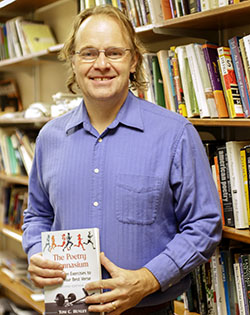Faculty and Staff

- Professor
- tom.hunley@wku.edu
- Grise 453C
- https://www.tomchunley.com/
Potter College Faculty Research/Creativity Award winner, 2008
Fundamental to my teaching is the fact that I enjoy my students. After all, without them, I wouldn’t be a teacher. I try to have an impact on them, but I know for a fact that they have an impact on me. As Peter Elbow wrote in Writing Without Teachers, “students can learn without teachers, even though teachers cannot teach without students.” I view my role as that of a guide, a facilitator, and a more experienced member of the class. I’m not a judge, an advocate for any particular social agenda, or a dispenser of knowledge. I have been an outspoken critic of the “workshop” approach to teaching creative writing. In my book, Teaching Poetry Writing: A Five-Canon Approach (Multilingual Matters LTD., 2007, New Writing Viewpoints Series), I contend that the workshop model is a grossly inefficient method that has achieved widespread acceptance more because of its convenience for instructors than because of any measurable pedagogical value. Critique is one valuable aspect of creative writing instruction, but it is not so important that it ought to take up the bulk of class time. In my creative writing classes, the majority of class time is spent on a rigorous battery of writing exercises based on the five canons of rhetoric: invention, arrangement, style, memory, and delivery. In “Diving In: An Introduction to Basic Writing,” Mina Shaughnassy quotes Leo Strauss’s advice to “always assume that there is one silent student in your class who is far superior to you in head and in heart.” How different this attitude is from the ones I sometimes hear expressed by writing instructors! I believe that if I respect my students enough to have high expectations for them, they will meet and surpass those expectations. As far as that silent student with the superior head and heart is concerned, I want to draw her out of her silence. I want him to lead class discussions, actively critique the writing of other students, and share his own writings with the class. I want my class to be a safe but challenging place where she can discover herself and explore the world around her.
Some of the links on this page may require additional software to view.

